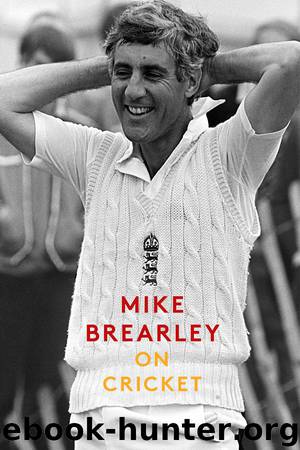On Cricket: A Portrait of the Game by Brearley Mike

Author:Brearley, Mike [Brearley, Mike]
Language: eng
Format: epub
ISBN: 978-1-47212-945-1
Publisher: Little, Brown Book Group
Published: 2018-10-03T16:00:00+00:00
27
THE SPIRIT OF CRICKET
The MCC has been responsible for the Laws of Cricket since 1787. In recent years, they have introduced a preamble to them referring to the Spirit of Cricket. There are those who think this unnecessary, and those who think it should be in the body of the Laws. This is my reaction .
‘Mankading’: Sachithra Senanayake runs out Jos Buttler, 2014.
Michael Atherton once suggested that the Spirit of Cricket is ‘a lot of well-meaning guff’. Others criticize the Spirit of Cricket statements for being too vague; they lead to contradictory interpretations.
Ian Bishop, the West Indies fast bowler and now commentator, has said: ‘Spirit of cricket is a noble and most welcome preamble to the laws as applied to this great game. But what is the use or fairness of that principle when it is invoked so inconsistently and conveniently?’ He argues that many examples are cases of outdated social conditioning.
Atherton agrees with Bishop’s response to one controversial instance: both assert that there is nothing wrong with ‘Mankading’ – the running out of the non-striking batsman for backing up too far.
Some years ago, I too struggled to accept this advocacy of the Spirit of Cricket and the placing of it as a preamble to the Laws of Cricket. My hesitation was to do with the risk of it sounding (or even being) patronizing, priggish or pompous.
In the days of empire and a more feudal MCC, the ‘spirit of cricket’ was, or could be, purveyed in a way that suggested hypocrisy and superiority. It could be used to stand for a set of standards that were proclaimed most loudly as part of the public school ethos, though not always lived out on the cricket field, let alone in other walks of life. The Victorian England of Empire was noted, for example, for swathes of sexual and financial irregularities among the upper and middle classes. One version of the English vice was hypocrisy; ‘perfidious Albion’ was how we were regarded in many parts of the world.
Another common failing seems to me to be an insistence on outward forms combined with a neglect of much more important moral or political shortcomings. To give one example: the MCC over-valued sporting contacts with official cricket in South Africa, ignoring for too long the shocking injustices of apartheid, especially in its impact on cricket and other sports. Moreover – and this is another failing, I think – when placed against the latter immorality, mere form, like whether one wears a jacket and tie to lunch, is in my view over-rated.
Today the atmosphere of the MCC has changed radically. It is now a kind of upper chamber of cricket, somewhat removed from the political and commercial issues that inevitably have to be faced and negotiated by the bodies at the sharp end, like the ICC, ECB or the Cricket Boards of different countries. As such, the MCC has a role in cricket akin to that of the House of Lords in the British Constitution, a chamber with little power, but with moral influence.
Download
This site does not store any files on its server. We only index and link to content provided by other sites. Please contact the content providers to delete copyright contents if any and email us, we'll remove relevant links or contents immediately.
| Cricket | Field Hockey |
| Lacrosse | Rugby |
| Track & Field | Volleyball |
Going Long by Editors of Runner's World(2362)
The Happy Runner by David Roche(2238)
Yoga For Dummies by Georg Feuerstein(1451)
Becoming Boston Strong by Amy Noelle Roe(1390)
Legacy by Kerr James(1294)
Winger by Smith Andrew(1260)
The Little Red Book of Running by Scott Douglas(1205)
Wodehouse At the Wicket by P.G. Wodehouse(1119)
Bowerman and the Men of Oregon by Kenny Moore(1118)
The Way of the Runner by Adharanand Finn(1103)
5050 by Dean Karnazes(1100)
Running Your First Marathon by Andrew Kastor(1074)
Swim, Bike, Run - Eat by Tom Holland(1051)
Blade Runner by Oscar Pistorius(1018)
The Coming Storm by Nigel McCrery(1009)
Spiked (Blocked Book 3) by Jennifer Lane(1000)
The Grade Cricketer by Dave Edwards(983)
The Amazing Test Match Crime by Adrian Alington(978)
The Shared Origins of Football, Rugby, and Soccer by Christopher Rowley(977)
